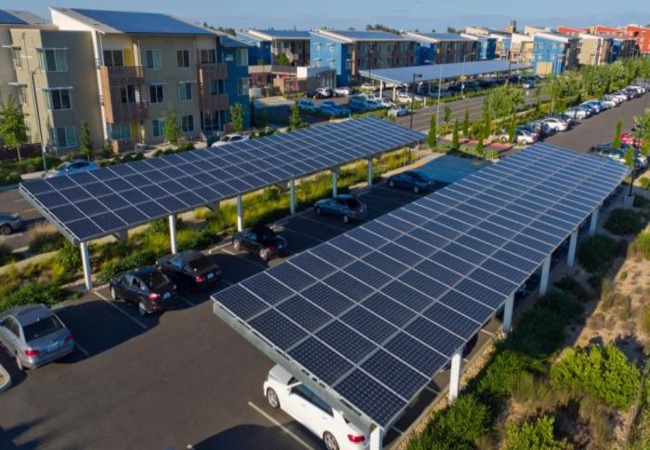- (702) 941-0911
- info@gfactorsolar.com
- Contact us at any time!

There are several solar incentives available for commercial projects in the United States. These incentives can help to reduce the cost of solar system installation and make it more affordable for businesses to invest in clean energy.
Here are some of the most important solar tax incentives for commercial projects:
Federal Investment Tax Credit (ITC)
The federal ITC is a 30% tax credit on the cost of a solar system. This credit is available to businesses of all sizes, and it can be applied to both new and existing systems. The ITC is scheduled to expire in 2032, but it is possible that it will be extended.
Federal Production Tax Credit (PTC)
The federal PTC is a per kilowatt-hour (kWh) tax credit for electricity generated by solar and other qualifying technologies for the first 10 years of a system’s operation. It reduces the federal income tax liability and is adjusted annually for inflation.
Federal ITC & PTC Bonus Credits
The federal Investment Tax Credit (ITC) and Production Tax Credit (PTC) bonus credits are additional incentives offered by the United States government to encourage the adoption of clean energy technologies, particularly solar and wind power. These bonus credits are available to projects that meet certain labor requirements or are located in designated areas.
Transfer Of Credits
Businesses who are not eligible for direct payment may sell all, or a portion, of the tax credits for a given year to an unrelated eligible taxpayer. Credits from a single property can be sold to multiple buyers in the same tax year.
Modified Accelerated Cost Recovery System (MACRS)
MACRS is a depreciation system that allows businesses to deduct the cost of certain assets, including solar systems, over a period of time. Businesses can choose to depreciate a solar panel system over a period of 5, 7, or 10 years.
State & Local Incentives
Many states and localities offer their own solar incentives in addition to the federal ITC. These incentives can take the form of tax credits, rebates, or other financial assistance.
Third-Party Power Purchase Agreements (PPAs)
PPAs are a way for businesses to finance solar systems without having to make a large upfront investment. Under a PPA, a third-party company owns and maintains the solar panel system, and the business agrees to purchase the electricity generated by the system at a fixed rate.
Energy Efficiency Tax Deduction
Businesses can also claim a tax deduction of up to $1.80 per square foot for buildings that meet certain energy efficiency standards. This deduction can be applied to the cost of energy-efficient upgrades, including solar systems.
Net Metering
Net metering is a program that allows businesses to sell excess electricity generated by their solar systems back to the grid. This can help to offset the cost of electricity from the grid.
In addition to these tax incentives, there are a number of other benefits to businesses that install solar systems. These benefits include:
Overall, there are a number of solar tax incentives and other benefits available to businesses. By taking advantage of these incentives, businesses can significantly reduce the cost of solar energy adoption and reap the long-term benefits of clean energy, including reduced energy bills, increased property value, and a positive environmental impact.
Non-Profit Organization Incentives
Non-profits can benefit from several solar tax credits and incentives. Here are some of the key solar tax credits available to non-profit organizations in the United States:
Department Of Energy (DOE) Article
Here is an article written by the DOE which provides a lot of great information regarding this topic: https://www.energy.gov/eere/solar/federal-solar-tax-credits-businesses
End Of Blog!
If you’re a property owner and would like to learn more, or if you’re interested in potentially working together, fill out the contact form/send an email/give us a call or text! Thank you.